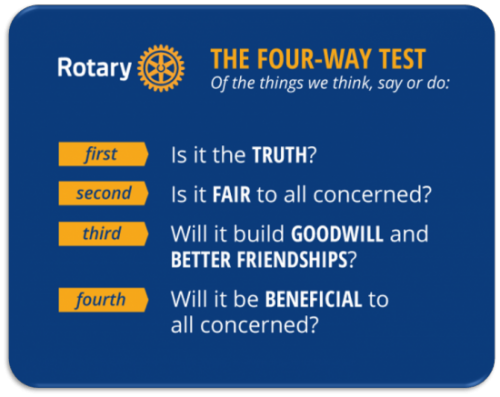The Four-Way Test
The Rotary Four-Way Test is an ethical guide used by Rotarians worldwide as a moral compass for their personal and professional relationships. It was adopted by Rotary International in 1943. The test encourages Rotarians to consider the ethical implications of what they think, say, or do.

About the Four-Way Test
The Four-Way Test is more than just a set of questions; it's a framework for ethical decision-making. Rotarians are encouraged to apply this test to their daily lives, both personally and professionally. It serves as a reminder of Rotary's core values and its commitment to ethical behavior.
- Personal Life: It can guide personal interactions, helping individuals build trust and maintain strong relationships.
- Professional Life: It can inform business decisions, promoting ethical conduct in the workplace and marketplace.
- Community Involvement: It can guide Rotary clubs in their service projects, ensuring that their efforts are truly beneficial and fair to the communities they serve.
The simplicity and universality of the Four-Way Test have contributed to its enduring relevance and widespread adoption within Rotary International. It transcends cultural and religious boundaries, providing a common ethical standard for its diverse membership around the world.
The Four-Way Test was created in 1932 by Rotarian Herbert J. Taylor when he was asked to take charge of a company facing bankruptcy. By applying these four principles to the company's business practices, Taylor is credited with its remarkable turnaround. Rotary International adopted the test in 1943, and it has since become one of the organization's most well-known and influential guiding principles.
The Four-Way Test
-- Explanation and Examples --
- Is it the TRUTH?
- This question emphasizes honesty and integrity in all aspects of life. It encourages individuals to ensure that their communication and actions are truthful and not misleading.
- Example: Before sharing a piece of information, a Rotarian would ask themselves if they are certain of its accuracy and if they are presenting it honestly without any distortion.
- Is it FAIR to all concerned?
- This question promotes impartiality and justice. It encourages consideration of the interests and perspectives of everyone involved in a situation.
- Example: When making a business decision, a Rotarian would consider how it will affect employees, customers, suppliers, and the community, striving for an outcome that is equitable for all.
- Will it build GOODWILL and BETTER FRIENDSHIPS?
- This question focuses on fostering positive relationships and understanding among people. It encourages actions and words that promote harmony and strengthen connections.
- Example: In a disagreement, a Rotarian would aim to communicate in a way that seeks to resolve the issue amicably and preserve the relationship, rather than escalating conflict.
- Will it be BENEFICIAL to all concerned?
- This question emphasizes mutual benefit and positive outcomes. It encourages actions that contribute to the well-being of everyone involved.
- Example: When considering a community project, a Rotary club would evaluate whether it will genuinely provide a positive and lasting benefit to the community as a whole.






